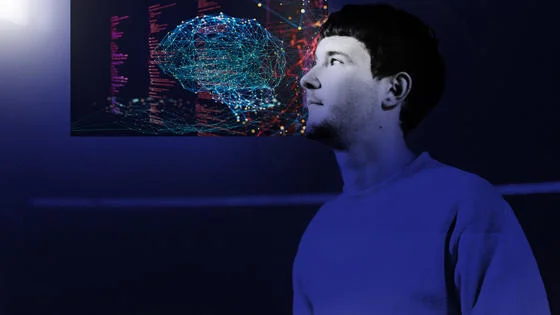What do we feel about robots, and what does that say about us?

Contents
From the dangers of trusting too much in AI to the idea that machines could become our friends, humanity’s relationship to robots has long provided a rich vein of drama for authors and screenwriters to tap into. But behind the well-worn science fiction tropes lies an important question that needs to be answered if robots are to be successfully integrated into society – how do we really feel about the robots that are becoming increasingly ubiquitous?
Researchers from LSE have been exploring this very question, with a new paper setting out the findings of a large-scale study into the way people respond to robots. "We wanted to understand how people see and react to robots – to measure what we call the ‘psychological processes’ they go through when they’re exposed to robots – as well as how personality predicts all this, because of course we are not all the same and personality typically determines who we are," says Dr Dario Krpan, Assistant Professor in the Department of Psychological and Behavioural Science at LSE, who co-authored the paper with Dr Jonathan Booth (Department of Management, LSE) and Dr Andreea Damien (Department of Psychological and Behavioural Science, LSE).
People ... first try to estimate whether the robot can be helpful in some way, whether it can harm them in some way, and if it is competent in what it does.
What is a robot?
The researchers surveyed 9,274 UK and US participants across seven studies, asking them first to imagine a robot and list as many of the areas serviced by robots that they could think of. After categorising these into 28 domains, ranging from the creative to education, hospitality and industry, the researchers then asked participants to list all the thoughts, feelings and behaviours that came to mind when they thought about robots within each domain.
The data revealed a vast array of different psychological responses – with the researchers identifying 149 in total, ranging from companionship, empathy and humour to anxiety, threat and self-doubt. The researchers find that all of these processes, however, can be placed in just three categories – positive, negative or competence-based.
"When people think about robots, we find that they first try to estimate whether the robot can be helpful in some way, whether it can harm them in some way, and if it is competent in what it does," explains Dr Krpan.
"It was surprising to me that these 149 different psychological processes fall into just three dimensions – I thought there would be more – but what is particularly interesting is that these responses correspond to how people perceive other humans. When we think about people, research has shown that we typically try to infer whether they have good or bad intentions towards us and whether they are competent at what they do. Our findings show that this is also how we view robots, regardless of the fact that robots are not living entities."
People who score highly for psychopathy ... tend to think that robots can read through them and essentially expose them for who they are.
Perfectionist or psychopath? How personality impacts the way we feel about robots
Dr Krpan and his colleagues also wanted to understand how personality might impact on the way we view robots. Their analysis revealed some intriguing findings. "We find that perfectionists in particular tend to feel really positively about robots because they associate perfection with robots to a higher degree than with humans. So the higher someone scores for perfectionism, the more positive they are likely to feel about robots," says Dr Krpan. "On the other side, we find that those who score highly for psychopathy feel the opposite, so they tend to dislike and feel sceptical towards robots."
This is likely to be because psychopaths tend to lack empathy and can often want to exploit others for personal gain, explains Dr Krpan: "Our analysis shows that people who score highly for psychopathy also feel more negatively toward robots. This is because they tend to think that robots can read through them and essentially expose them for who they are. Psychopaths can also be resentful of very complex inventions from other human beings, so there is also a degree of jealousy around why they don't like highly sophisticated technological equipment."
How can policymakers successfully integrate robots into society?
However one might feel about robots, as a society, we are becoming increasingly reliant on these machines, making it vital that regulation helps ensure that robots solve the problems that need solving rather than simply causing more.
"Our finding that people perceive robots very similarly to how they perceive humans is helpful for policymakers, because it means they don’t necessarily need to invent something new," says Dr Krpan. "What does need to be addressed, however, are certain fears that people have about robots. For example, the issue of trust came up a lot in our study, as well as concerns about privacy and harm."
One way to overcome the negative reactions people have towards robots and help them adapt to these new technologies is to foster the positive impact that robots could have on them. "We find that people also see many positive characteristics in robots – for example, robots that help with chores like cleaning or cooking are seen by many as liberating – and if these are met, then the more negative issues could disappear," he argues.
There is definitely motivation for major change. What is preventing people from carrying out this transformative change are our current policies.
We’re more open to radical change than one might think
While Dr Krpan’s findings will provide useful evidence for those tasked with regulating the way these machines are used within society, they also feed into his wider research, which focuses on how new technologies could be used to bring about transformational behavioural change.
"The reality is that we will need both technological innovations and other approaches to encourage us to substantially change our habits," he says. "There are many examples of how interventions can help influence behaviour incrementally, but we have less knowledge about what is needed to encourage the more major changes people will need to undertake if we are to tackle some of the major issues facing us such as adapting to climate change."
With so many fears around the growth of AI, and the fact that change is often thought of as hard to achieve, Dr Krpan could be forgiven for feeling pessimistic about our ability to make this jump. Research conducted with Dr Frédéric Basso (Department of Psychological and Behavioural Science, LSE), however, reveals that we may be more open to the idea of radical change than might be assumed.
Drs Krpan and Basso developed a psychological scale that measured people’s motivation to undertake transformative change using data from people in the UK and US. "We call this personality trait ‘utopian impulse’," explains Dr Krpan. "Initially I thought that many people wouldn't be supportive of transformative change, because people can find change difficult, but what we found was that people, on average, have relatively high utopian impulse, meaning that they’re not at all negative about transformative change. In fact, they tend to be positively inclined to the idea of innovating and transforming society to resolve some of the biggest issues we’re facing such as climate change and inequalities."
"From that we can conclude that there is definitely motivation for major change," he continues. "What is preventing people from carrying out this transformative change are our current policies. We don’t have an easy environment to bring about the changes needed, but our data shows that if we can bring in the right regulations and create an environment that allows people to make radical changes to their lives, they are keen to do so if it will help resolve some of the biggest issues that we face. For this reason, I’m much more positive than I used to be when I think about whether the transformative changes we need to see for planetary health can really occur."
Dr Dario Krpan was speaking to Jess Winterstein, Deputy Head of Media Relations at LSE.
Download a PDF version of this article






